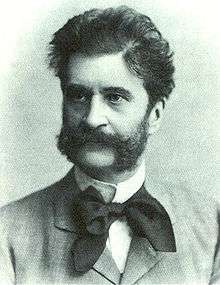Der lustige Krieg
Der lustige Krieg (The Merry War) is a three-act operetta composed by Johann Strauss II. The work was first performed on 25 November 1881 at the Theater an der Wien. Its libretto was by F Zell (Camillo Walzel) and Richard Genée. The operetta was well received at its premiere, and was performed 69 times during its first run.[1]
Roles
| Role |
Voice type |
Premiere cast, 25 November 1881
(Conductor: Johann Strauss II) |
|---|
| Violetta, Countess Lomelli, a widow |
soprano |
Caroline Finaly |
| Artemisia, Princess of Massa-Carrara |
contralto |
Rosa Streitmann |
| Else Groot |
soprano |
|
| Balthasar Groot, her husband, a tulip merchant from Holland |
baritone |
|
| Marchese Sebastiano |
tenor |
Alexander Girardi |
| Colonel Umberto Spinola |
tenor |
|
| Riccardo Durazzo |
baritone |
|
| Fortunato Franchetti |
bass-baritone |
|
| Biffi |
tenor |
|
| Pamfilio |
baritone |
|
| First lady |
soprano |
|
| Second lady |
mezzo-soprano |
|
| Third lady |
contralto |
|
| First commissioner |
tenor |
|
| Second commissioner |
bass |
|
| Colonel van Scheelen |
spoken |
|
| Officers and their wives, soldiers and people (chorus) |
|
Synopsis
- Place: The garrisoned Mediterranean city of Massa.[1]
- Time: First part of the 18th century
It concerns a dispute between two states. The 'war' between them is played out as a game of love between Colonel Umberto Spinola, the commander-in-chief of the Genoese army, and the widowed Countess Violetta. Despite the name of the operetta, there is no fighting or bloodshed in the 'war'.
Recordings
Johann Strauss: Der lustige Krieg, ORF Radio-Symphonie Orchester, Wiener Jeunesse-Chor, Wiener Motettenchor
- Conductor: Ulf Schirmer
- Principal singers: Eva Mei, Jorma Silvasti, Daphne Evangelatos, Jörg Schneider, Paul Armin Edelmann, Birgid Steinberger
- Recording date:
- Label: ORF CD240
References
- Notes
- Sources
- Casaglia, Gherardo (2005).[http://www.amadeusonline.net/almanacco?r=&alm_testo=Der_lustige_Krieg "Der lustige Krieg"]. Almanacco Amadeus (Italian).
|
|---|
|
| Operettas | |
|---|
|
| Waltzes |
- Sinngedichte, Op. 1 (1844)
- Gunstwerber, Op. 4 (1844)
- Sträußchen, Op. 15 (1846)
- Klange aus der Walachei, Op. 50 (1850)
- Frohsinns-Spenden, Op. 73 (1850)
- Lava-Ströme, Op. 74 (1850)
- Rhadamantus-Klänge, Op. 94 (1851)
- Idyllen, Op. 95 (1851)
- Mephistos Höllenrufe, Op. 101 (1851)
- Liebeslieder, Op. 114 (1852)
- Phönix-Schwingen, Op. 125 (1853)
- Novellen, Op. 146 (1854)
- Nachtfalter, Op. 157 (1855)
- Glossen, Op. 163 (1855)
- Man lebt nur einmal!, Op. 167 (1855)
- Abschieds-Rufe, Op. 179 (1856)
- Phänomene, Op. 193 (1857)
- Abschied von St. Petersburg, Op. 210 (1858)
- Hell und voll, Op. 216 (1859)
- Promotionen, Op. 221 (1859)
- Accelerationen, Op. 234 (1860)
- Immer heiterer, Op. 235 (1860)
- Grillenbanner, Op. 247 (1861)
- Klangfiguren, Op. 251, (1861)
- Dividenden, Op. 252
- Karnevalsbotschafter, Op. 270 (1862)
- Leitartikel, Op. 273 (1863)
- Morgenblätter, Op. 279 (1863)
- Studentenlust, Op. 285 (1864)
- Aus den Bergen, Op. 292 (1864)
- Bürgersinn, Op. 295 (1865)
- Flugschriften, Op. 300 (1865)
- Wiener Bonbons, Op. 307 (1866)
- An der schönen blauen Donau, Op. 314 (1867)
- Künstlerleben, Op. 316 (1867)
- Die Publicisten, Op. 321 (1868)
- G'schichten aus dem Wienerwald, Op. 325 (1868)
- Illustrationen, Op. 331 (1869)
- Wein, Weib und Gesang, Op. 333 (1869)
- Freuet Euch des Lebens, Op. 340 (1870)
- Neu Wien, Op. 342 (1870)
- Tausend und eine Nacht, Op. 346 (1871)
- Wiener Blut (waltz), Op. 354 (1873)
- Carnevalsbilder, Op. 357 (1873)
- Bei uns Z'haus, Op. 361 (1873)
- Wo die Zitronen blühen, Op. 364 (1874)
- Du und du, Op. 367 (1874)
- Cagliostro-Walzer, Op. 370 (1875)
- O schöner Mai!, Op. 375 (1877)
- Rosen aus dem Süden, Op. 388 (1880)
- Nordseebilder, Op. 390 (1880)
- Kuss-Walzer, Op. 400 (1881)
- Frühlingsstimmen, Op. 410 (1883)
- Lagunen-Walzer, Op. 411 (1883)
- Schatz-Walzer, Op. 418 (1885)
- Wiener Frauen, Op. 423 (1886)
- Donauweibchen, Op. 427 (1887)
- Kaiser-Jubiläum-Jubelwalzer, Op. 434 (1888)
- Kaiser-Walzer, Op. 437 (1888)
- Rathausball-Tänze, Op. 438 (1890)
- Gross-Wien, Op. 440 (1891)
- Seid umschlungen, Millionen!, Op. 443 (1892)
- Trau, schau, wem!, Op. 463 (1895)
- Farewell to America
|
|---|
|
| Polkas |
- Herzenslust, Op. 3
- Explosions-Polka, Op. 43
- Veilchen, Op. 132
- Tritsch-Tratsch-Polka, Op. 214 (1858)
- Demolirer, Op. 269 (1862)
- Vergnügungszug, Op. 281 (1864)
- 'S gibt nur a Kaiserstadt, 's gibt nur a Wien!, Op. 291
- Lob der Frauen, Op. 315
- Postillon D'Amour, Op. 317 (1867)
- Leichtes Blut, Op. 319 (1867)
- Figaro-Polka, Op. 320 (1867)
- Ein Herz, ein Sinn!, Op. 323
- Freikugeln, Op. 326 (1868)
- Éljen a Magyar!, Op. 332
- Im Krapfenwald'l, Op. 336 (1869)
- Die Bajadere, Op. 351
- Vom Donaustrande, Op. 358
- Bitte schön!, Op. 372 (1875)
- Auf der Jagd, Op. 373 (1875)
- Banditen-Galopp, Op. 378 (1877)
- Waldine, Op. 385 (1879)
- Neue Pizzicato Polka, Op. 449
|
|---|
|
| Marches | |
|---|
|
| Quadrille | |
|---|
|
| Other | |
|---|
|
| Family | |
|---|
|
| In media | |
|---|
